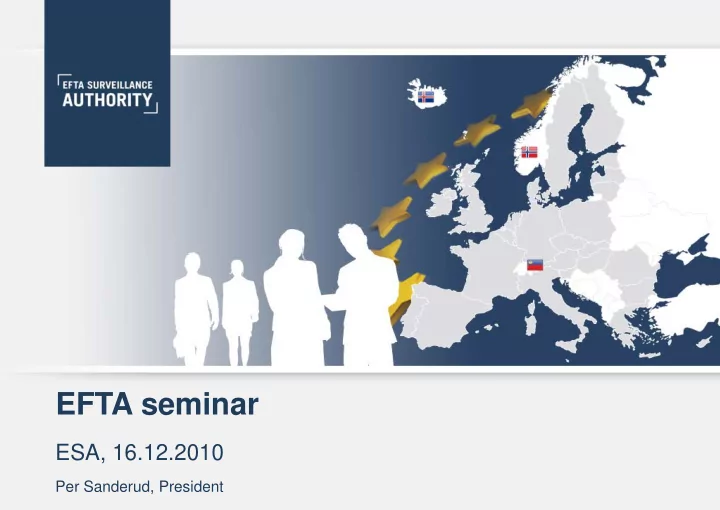

1 2 3 4 5 EFTA seminar ESA, 16.12.2010 Per Sanderud, President
ESA The EEA agreement grants access to the internal marked – binding obligation to all EEA countries ESA shall survey that the EEA/EFTA countries comply with the agreement ESA is independent of the Governments College “board” with three members 60-70 staff from 16 nations, need more EFTA nationals
What is the EEA Agreement? Does not include ( inter alia ): Common agricultural and fisheries Does include: policy Economic co-operation Customs union and common commercial policy Focus on internal markets– Economic and monetary union the four freedoms Taxation Rules on competition and states aid Justice and home affairs (N.B.: The Schengen- agreement) Common foreign and security policy Consequences of Lisbon treaty?
The two Pillar Structure
Certain charateristics of the EEA Agreement The EEA Agreement is dynamic New rules are adopted every month EEA law is interpreted by the EU and EFTA Courts, the Commission and the Authority The EEA Agreement requires homogeneity Same interpretation of the rules in all 30 countries
Case handling Informal contact Formal proceedings 1. Letter of formal notice 2. Reasoned Opinion 3. EFTA Court Referral
Pending cases by category 2006 2007 2008 2009 Complaint 149 145 144 130 Notification 82 94 112 50 Obligatory Tasks 103 101 92 115 Own Initiative 265 325 269 215 Total 599 665 617 510
Scoreboard July 2010 2.5 2.0 Transposition deficit as a percentage 1.5 1.0 1.0 target 0.5 0.2 0.2 0.3 0.4 0.4 0.5 0.5 0.5 0.5 0.6 0.6 0.7 0.7 0.7 0.7 0.7 0.8 0.9 0.9 0.9 1.1 1.1 1.2 1.3 1.3 1.5 1.5 1.8 2.1 2.4 0.0 DK MT SK FI NOR LIE LV 8 LT SI BG NL BE ES HU RO UK SE DE EE IE AT IT CY FR ISL CZ LU PL PT EL 3 3 5 6 7 8 8 8 9 9 10 10 10 10 10 12 13 14 14 16 17 18 19 22 23 23 27 31 36 Number of directives not notified
Exampels of cases – the four freedoms Waterfall reversion act (Norway) Exit taxation (Norway) Ownership restrictions stock exchange(Norway) Tollroads(Norway) Waterscooters (Norway) Financial crises Iceland, Icesave and ranking of creditors Phosphates fish, Iceland and Norway Residence requirements (Liechtenstein) Freedom of establishment
State Aid The state aid rules Main principle: State aid is prohibited State aid: Selective aid to undertakings, in whatever form A number of exceptions (soft law) Requests from an EFTA State to grant state aid must be notified to and approved by the Authority, stand-still obligation Authority may request that unlawful aid be recovered Marked investor principle
State aid and municipalities-Important issues Services of general interest, Altmark criteria's Cross subsidisation Guarantees
Some important cases – state aid Financial crises (Iceland/Norway) Energy and environment (CCS, ETS,windmill park)(Norway) Icelandic Housing Fund (Iceland) State garantees power contracts/ companies (Norway/Iceland)
Competition rules Competition rules applicable to undertakings Cartels and other forms of concertation between undertakings Abuse of a dominant market position The Authority monitors competition in EFTA States, co-operates closely with national authorties and Commission Concentrates on cross-border problems The Authority may issue fines to undertakings for breaches of EEA competition rules Examples from Norway;Norway Post, Color line, bus companies
Other tasks Veterinary control - inspections Transport – airport and harbour security Electronic communications, review of national markets regulations Competence to take decisions/give exemptions according directives and regulations
www.eftasurv.int
Recommend
More recommend